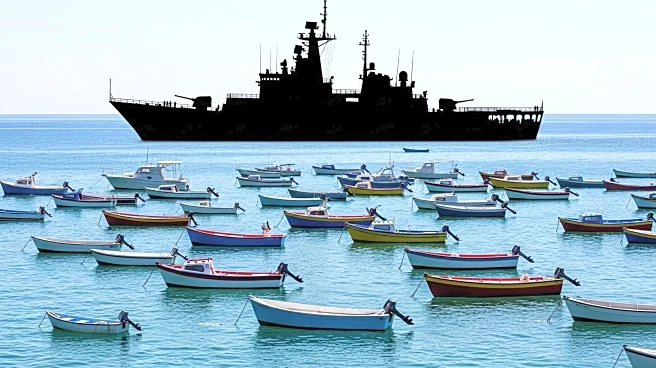What's Happening?
The Israeli military has intercepted and boarded several vessels from the Freedom Flotilla Coalition (FFC) as they were sailing towards Gaza. The FFC reported that the military attacked a boat named The Conscience, which was carrying 93 journalists, doctors, and activists, before intercepting three smaller boats. The passengers are currently being held in unknown conditions, according to the FFC. Israel's Ministry of Foreign Affairs confirmed the raid, stating that the attempt to breach the legal naval blockade ended without success. The vessels and passengers have been transferred to an Israeli port, and all passengers are reportedly safe and in good health, with plans for prompt deportation. The flotilla was carrying over $110,000 worth of vital aid, including medicines and nutritional supplies, intended for Gaza's hospitals.
Why It's Important?
This interception highlights ongoing tensions surrounding the blockade of Gaza and the international efforts to deliver aid to the region. The incident underscores the challenges faced by humanitarian missions attempting to navigate geopolitical barriers. The interception has drawn international condemnation, including from Malaysian Prime Minister Anwar Ibrahim, who demanded the release of Malaysian activists involved. The broader implications include potential diplomatic strains between Israel and countries whose nationals were aboard the flotilla. The event also raises questions about the legality of Israel's actions in international waters and the treatment of activists in custody, which could impact international perceptions of Israel's policies and actions.
What's Next?
The passengers of the intercepted flotilla are expected to be deported promptly, according to Israel's Ministry of Foreign Affairs. The incident may lead to further diplomatic discussions and potential protests from countries whose citizens were involved. Activist groups may continue to organize similar missions, challenging the blockade and seeking to deliver aid to Gaza. The international community may call for investigations into the treatment of activists during detention, potentially influencing future humanitarian efforts and diplomatic relations.
Beyond the Headlines
The interception of the flotilla raises ethical and legal questions about the rights of humanitarian missions in conflict zones and international waters. The treatment of activists, including allegations of abuse, could lead to calls for accountability and changes in how such missions are handled. The ongoing blockade of Gaza and attempts to deliver aid highlight the complex interplay between humanitarian needs and geopolitical strategies, potentially influencing long-term policy decisions and international relations.









